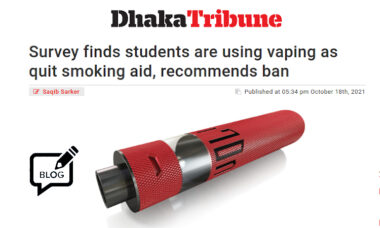 It’s the hot button vaping topic everywhere, not just in the US, where the decision of the Food and Drug Administration (FDA) to authorise marketing of even one brand of e-cigarette product (while turning down millions of others) has caused apoplexy in certain quarters. E-cigs – devised, marketed and sold as an aid to quitting smoking – getting into the hands and mouths of young people.
It’s the hot button vaping topic everywhere, not just in the US, where the decision of the Food and Drug Administration (FDA) to authorise marketing of even one brand of e-cigarette product (while turning down millions of others) has caused apoplexy in certain quarters. E-cigs – devised, marketed and sold as an aid to quitting smoking – getting into the hands and mouths of young people.
Whether it’s based on science or hysteria (or a hybrid of those), public handwringing about the alleged “epidemic” of youth vaping has become tantamount to an epidemic itself. But even accustomed as we are to seeing the same old headlines, this one from Bangladesh’s leading English-language newspaper the Dhaka Tribune is breathtaking: “Survey finds students are using vaping as quit smoking aid, recommends ban”.
A government that relies heavily on tax income from tobacco might see the sense in that recommendation – if it’s a highly cynical government, and if it fails to take into account the economic cost of lung cancer and all the other diseases associated with smoking. But as a message from a major humanitarian charity (the Dhaka Ahsania Mission) and the public health department of a large university (Dhaka’s North South University) it’s hard to make much sense of. Except as a particularly vivid illustration of the double-think exhibited by so many of those who would ban something on public health grounds even while admitting it could save lives.
To be fair to the Dhaka Tribune, it plays the story straight, and balances it with some quotes on harm reduction introduced by the statement: “Vaping supporters say that it is significantly less harmful than cigarette smoking and helps smokers quit fatal tobacco addiction.” It also makes the point right at the start that the survey mentioned in the headline was “a small-scale focus group”.
But the fact that such a headline can appear at all – and that it appears to represent fairly the attitude of some influential bodies – is another clear sign of what those vaping supporters are up against in getting their point across. And not just in Bangladesh, either.
– Aidan Semmens ECigIntelligence staff






